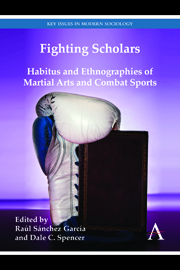Book contents
- Frontmatter
- Dedication
- Epigraph
- Contents
- Contributors
- Glossary
- Chapter 1 Introduction: Carnal Ethnography as Path to Embodied Knowledge
- Chapter 2 Habitus as Topic and Tool: Reflections on Becoming a Prizefighter
- Chapter 3 In Search of a Martial Habitus: Identifying Core Dispositions in Wing Chun and Taijiquan
- Chapter 4 Each More Agile Than the Other: Mental and Physical Enculturation in Capoeira Regional
- Chapter 5 ‘There Is No Try in Tae Kwon Do’: Reflexive Body Techniques in Action
- Chapter 6 ‘It Is About Your Body Recognizing the Move and Automatically Doing It’: Merleau-Ponty, Habit and Brazilian Jiu-Jitsu
- Chapter 7 ‘Do You Hit Girls?’: Some Striking Moments in the Career of a Male Martial Artist
- Chapter 8 The Teacher's Blessing and the Withheld Hand: Two Vignettes of Somatic Learning in South India's Indigenous Martial Art Kalarippayattu
- Chapter 9 White Men Don't Flow: Embodied Aesthetics of the Fifty-Two Hand Blocks
- Chapter 10 Japanese Religions and Kyudo (Japanese Archery): An Anthropological Perspective
- Chapter 11 Taming the Habitus: The Gym and the Dojo as ‘Civilizing Workshops’
- Chapter 12 ‘Authenticity’, Muay Thai and Habitus
- Chapter 13 Conclusion: Present and Future Lines of Research
- Epilogue Homines in Extremis: What Fighting Scholars Teach Us about Habitus
- References
Chapter 12 - ‘Authenticity’, Muay Thai and Habitus
Published online by Cambridge University Press: 05 March 2014
- Frontmatter
- Dedication
- Epigraph
- Contents
- Contributors
- Glossary
- Chapter 1 Introduction: Carnal Ethnography as Path to Embodied Knowledge
- Chapter 2 Habitus as Topic and Tool: Reflections on Becoming a Prizefighter
- Chapter 3 In Search of a Martial Habitus: Identifying Core Dispositions in Wing Chun and Taijiquan
- Chapter 4 Each More Agile Than the Other: Mental and Physical Enculturation in Capoeira Regional
- Chapter 5 ‘There Is No Try in Tae Kwon Do’: Reflexive Body Techniques in Action
- Chapter 6 ‘It Is About Your Body Recognizing the Move and Automatically Doing It’: Merleau-Ponty, Habit and Brazilian Jiu-Jitsu
- Chapter 7 ‘Do You Hit Girls?’: Some Striking Moments in the Career of a Male Martial Artist
- Chapter 8 The Teacher's Blessing and the Withheld Hand: Two Vignettes of Somatic Learning in South India's Indigenous Martial Art Kalarippayattu
- Chapter 9 White Men Don't Flow: Embodied Aesthetics of the Fifty-Two Hand Blocks
- Chapter 10 Japanese Religions and Kyudo (Japanese Archery): An Anthropological Perspective
- Chapter 11 Taming the Habitus: The Gym and the Dojo as ‘Civilizing Workshops’
- Chapter 12 ‘Authenticity’, Muay Thai and Habitus
- Chapter 13 Conclusion: Present and Future Lines of Research
- Epilogue Homines in Extremis: What Fighting Scholars Teach Us about Habitus
- References
Summary
Introduction
Many authors have commented on the introduction and diffusion of Asian martial arts into the English-speaking cultures and its impact on the philosophical and spiritual elements of martial arts (Chan 2000; Krug 2001; Villamon et al. 2004). Krug (2001) asserts that post—World War II, the cultural appropriation of Okinawan karate and the integration of this martial art into American culture had the effect of removing many of the knowledges and meanings systems of karate and replacing them with American meaning systems. Karate became converted into a sport, free of its original bunkai (explanations) of kata and a considerable portion of its esoteric philosophies. Also, the underlying sciences of chi, healing and health-enhancing aspects were removed and replaced with the individualized competitive sport form of karate, more closely aligned with the American ethos (Krug 2001, 403). According to Villamon et al. (2004), judo has undergone a similar translation in its ascendancy into an Olympic sport. Drawing from Anthony Giddens's concept of reflexive modernization, these authors show the disembedding of the philosophic and moral aspects of mutual prosperity integral to traditional forms of judo developed by Jigaro Kano, and a re-embedding of a philosophy of meritocratic individualism central to Western sports. The effect is the conversion of judo as a way of life into an efficiency-based, winner-take-all mentality sport (Villamon et al. 2004, 146).
- Type
- Chapter
- Information
- Fighting ScholarsHabitus and Ethnographies of Martial Arts and Combat Sports, pp. 171 - 184Publisher: Anthem PressPrint publication year: 2013

